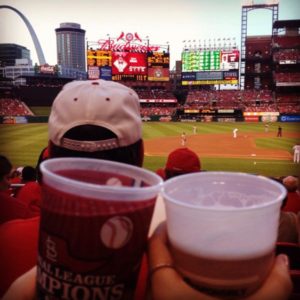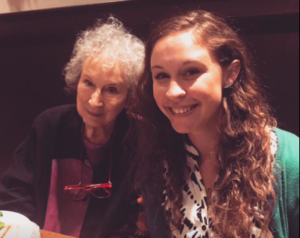October 6th, 2017
We All Give Up Something
Cassie Shaw, MD

Cassie Shaw, MD, is a 2017-18 Chief Resident in Internal Medicine at Saint Louis University Hospital in Saint Louis, MO
We all give up something, usually many somethings, to become doctors. It all starts with medical school where we spend hours listening to lectures, studying books, reviewing slides and reading notes. It continues into residency where we have little control over our schedules, working weekends and holidays; cherishing each of our 4 days off per month. We miss birthdays, weddings, family gatherings, and reunions. Instead of spending holidays with our own families, we spend them with our patients and their families. After completing my first 2 weeks as an attending, I quickly realized that the 24 hour per day work while on service is unforgiving. I would wake drenched with sweat after a panicked nightmare about a missed diagnosis. I would check charts right before bed and first thing upon awakening.

Thankful for generous attendings who donate their Cardinals season tickets to poor, tired residents. This outing was a definite plus in the sanity column.
However, as I write this, I hear the words of my Program Director in my ears: “no one wants to listen to a physician whine.” He’s right. Being a doctor is a sought after, respected, and well-compensated position. I wanted this. In fact, I made deals with the universe for years to get where I am today: “I will study every single night if you just let me into medical school.” No matter the sacrifices required, I still want this, and I cannot imagine doing anything but exactly this. It’s not just that no one wants to listen to a doctor whine — we aren’t alone in this sacrifice. Many of our colleagues in other health professions and non-health professions sacrifice as well. Right or wrong, in this country, we often put our profession first and allow family, fun, and free time to fall in line thereafter.
So how do we deal with the losses of days, hours, and important events with our loved ones? How do we stay sane and have lives outside of the workplace? As kids say these days, how do we fight the FOMO (Fear Of Missing Out)?
Until this year, I thought that I had created a good work-life balance. For instance, while I was in residency, I averaged one concert per month. It didn’t matter if I was post call, pre call, or had to be at the hospital at 5 AM the next day, if there was an artist in town that I wanted to see, I was at that concert. I sacrificed sleep for sanity. I thought I was doing it right: living a perfect balance of both work and life. However, I still let a lot of other things that made me happy fall to the wayside. Namely, I rarely read for pleasure; I picked up a book only long enough to read a few sentences before falling asleep. I changed that during my chief year. I got a library card, and I started reading again. I also joined a book club where I could surround myself with individuals who also wanted to nerd out over literature. This was probably the first time in years where I came to a table and discussed something other than labs and images and medications and barriers to discharge. It was invigorating.
Another strategy for maintaining a positive work-life balance is addition by subtraction. I did this more by accident and technological ignorance than by conscious choice. My hospital switched their email program from Gmail to Outlook this year, and when I put the new application on my phone, I didn’t know how to turn on the notifications, so I just didn’t. Since then, I only check my email once per day and rarely on the weekends. Checking my email on my own terms has been life changing. Although I’m not exactly “unplugged,” I feel unplugged. My attention is focused on the present. My pocket is not constantly pinging, and I don’t feel the pressure to always be available. This isn’t a new strategy, I know, but I always felt like I was somehow required to be immediately responsive as a physician, even when I wasn’t on call. I felt as if I was going to miss an opportunity or let someone down. In reality, the only thing I was missing was my own life.
In the last few months, as I’ve made these seemingly minor changes, I’ve noticed that I’ve felt more whole. I have realized that I’m not defined by my profession. I’ve felt more like me. I’ve also noticed that my interactions with others have been more meaningful and far less stressful. I’m able to apply myself to tasks in a more efficient way. This isn’t just a feeling I alone have; researchers at San Francisco State University looked into their own employees and found that those with creative outlets and hobbies outside of the workplace perform better and interact more positively with their colleagues (J Occup Organ Psychol 2014; 87:579).
It’s no secret; we are all busy. We all want for more hours in the day and to use those hours to be supportive and present for our patients, our residents, our students, our family, our loved ones, and our Labradoodles. Okay, maybe that last one is just me. The reality is that we can’t have more hours. We have 24 of them: no more, no less. How we choose to spend our hours makes all the difference. I am not advocating for you to spend less time devoted to providing the best care to your patients, and I know that means you will be put in a difficult position where you have to, again, give up something. I am advising that that “something” not be yourself. Cherish those things that make you you. Keep going to concerts, keep reading, keep writing, keep running, keep dancing, keep watching your kids’ cross country practices, keep playing chess. The person who was accepted into medical school and subsequently into residency was the entire you, the whole you, and that is the you who is the best at your job.





Thank you for writing this informative piece. We all need to refresh and rejuvenate ourselves physically, mentally, spiritually, and emotionally/socially. When we get busy, we typically neglect the 1st three. The first three are the most important – every day, we all must have a personal daily victory and devote at least 1 hour to those first 3 areas. Eating properly, sleeping properly, exercising, reading, writing, doing a hobby, meditation, planning for the future, meeting with a mentor, faith, etc are all ways to do it. Putting the phone down and unplugging from technology is critical – our phones make us me-focused over we focused – it’s a big time waster that is often not used for productive things.
We always say we don’t have enough time to do it. That’s just an excuse. Make the time. As you have found, you are more efficient, engaged, and happier. We all must focus on important and not urgent things (Quadrant II activities). It will make you a better doctor, parent, spouse, family member, neighbor, and person.
We created a book club here at USF to focus exactly on this during medical school. So far, we have had 21 total students participate. Waiting until residency or after residency to develop these resiliency skills is too late.
Happy to discuss if you are interested.
Thanks,
Kevin O’Brien, MD
kobrien@health.usf.edu
That’s very encouraging to see that you’ve seen such a robust participation from Medical Students. I feel like simply overcoming the guilt (for lack of a better word) that I wasn’t studying as a medical student would’ve been a barrier for me to participate in such an activity. Although I’m not alone in this thinking, it’s definitely not conducive to a balanced and maintainable lifestyle and I hope to talk to and demonstrate for my students about the importance of keeping these areas of our lives intact.
I’d love to discuss the book list you all have used for your students! I’ll shoot you an email to discuss further. Thanks!
Great to see you doing so well, Cassie. I was happy to see your name in my inbox this morning. You’re a Cal Newport in the making.
I’m a new attending (just finished residency this year) and I agree with you. I pose this question- If everyone is feeling this way (which they are), and the inability to have any balance in residency is well known (which it is), why do we just keep accepting it? Why isnt the concept of residency evolving as we learn more about the importance of self-care and life-work balance?
These are great questions that I’ve also pondered. I wonder if sometimes our colleagues are balancing these things better than others but we don’t share these extra curricular activities because we are all “supposed” to be spending every minute studying as our competitive field has taught us. Since joining my own books club, I found interns, first year fellows and even very busy attendings were also in the club and I was encouraged by the fact these individuals were maintaining these aspects of their life. Perhaps if we, as new attendings, live more out loud in this way and demonstrate how we live our lives outside of the hospital it can encourage our trainees to do so also.
Más médicos como usted por favor 🙂
Dr. Moore, so great to see your name on here, too! Thanks for giving my blog a read. Ha, love Cal Newport! Hope life is good!